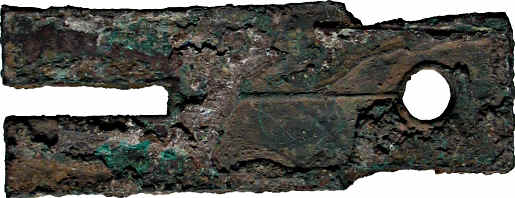
* Chinese Pu - Symbolic of Monetary History *
Yes, we're overdue on “... a simple, brief, nontechnical way to explain the idea.” I'm postponing that a bit nevertheless, and will instead elaborate on the now sadly common bad phraseology of 'monetizing' a Blog (etcetera).
First, I've found two more definitions (from www.answers.com) namely:
American Heritage Dictionaries
mon ·e ·tize
tr.v., -tized, -tiz ·ing, -tiz ·es.
1. To establish as legal tender.
2. To coin (money).
3. To convert (government debt) from securities into currency that can be used to purchase goods and services.
Investopedia.com
Monetize
1. To convert into money.
2. To convert from securities into currency that can be used to purchase goods and services.
Investopedia Says: For example, you'll often hear Internet marketers talk about "monetizing website visitors." This is another way of saying that the marketers are trying to figure out a way of making money from website visitors, such as through advertising, e-commerce, etc.
Note, we needed to go to a non-dictionary source before deteriorating to the final paragraph above (yet real dictionaries can't be far behind). This represents a curiously irksome phenomenon that fully captures an ever present Orwellian tendency - i.e. using a word, symbol, or image to represent or stand for something that wholly contradicts its original intent or significance. Maybe it's mere unplanned stupidity in the case of the word ‘monetize’. But that clearly cannot be an alibi for the obscene propaganda dirtying so much of the world's currencies. In Honduras they actually name their currency after the native warrior Lempira who was murdered while fighting to free his people from exactly the very thing this same currency represents! Similarly, U.S. currency employs imposing images & names to lend credibility to precisely the type of vile fiat monetary systems that these same men diligently fought to secure their country against.
Ample more examples exist where a clean concept is arrogantly and viciously turned on its head; yet everyone just seems to follow along, readily swallowing any illogical vulgarity feed to them. It may be useful to briefly entertain a few of these if anyone likes. Moreover, legal tender laws, etc. will most definitely need to be eventually addressed.
Golly-gee, all this has made me feel nearly nauseous. But thanks to Jon W. Matonis we can start feeling a bit better. Almost 11 years ago, Mr. Matonis wrote a nice article titled “Digital Cash & Monetary Freedom”. The Following is taken from his “Contents” in the hope of provoking you into clicking on his above link:
...
2. Why Monetary Freedom is Important
3. Key Elements of a Private Digital Cash System
4. Implementing a Non-political Unit of Value
5. Managing a Non-political Unit of Value
...
Jon only mentions “monetize’ once - saying, “Anything and everything can be monetized.” While my compulsions to precision would not permit that wording, the sentiment - nevertheless - is truly beautiful (as he is NOT repugnantly talking about selling nor assigning a dollar figure to things). A large part of my future efforts will be dedicated to elaborating on his worthy elucidation.
Anyway, returning to Blogs and WEB sites. Either can be genuinely monetized. One readily apparent means would be to issue certificates of fractional ownership in your site. These could then potentially be used (as money) to buy, trade for, or secure some gainful end. Now rather than getting into how this is done; please simply consider the gratification factor something like this could represent over graveling for dollars. Imagine enjoying honest objective gains realized directly from free persons for value you've created - rather than depending on a questionable monetary system under the control or third parties (i.e. as long as one can produce virtue, there are no concerns of a dollar crunch). If this strikes any kind of ‘cord’ from within, that's a great prognostic for a valiant future; otherwise, this blog can hold no worth for you.
Back to, “... a simple, brief, nontechnical way to explain the idea.” My first post mentioned, “The following represents my third attempt to better accomplish that very objective.” As we know, said ‘third attempt’ has yet to be actualized - two other efforts whoever, are fully implied. The first (an explanation for RMS) is cited in the previous posts (and is made available again here). Now (due to the delay of adequate alternate material) here's the link to my second paper, namely show2.html. Perhaps I should have lead with this outline since it has been cited as much easier to grasp. The initial plan, of course, was to lead with neither and instead create still another wholly new perspective (to better get the idea across).
Mon Mar 6 18:57:13 2006
